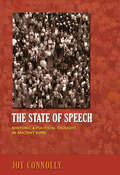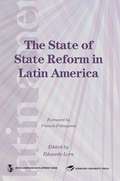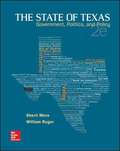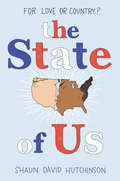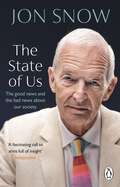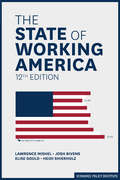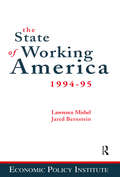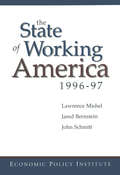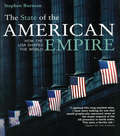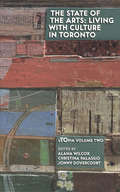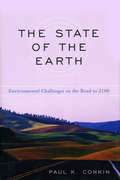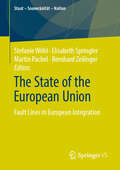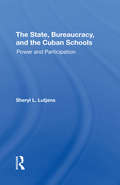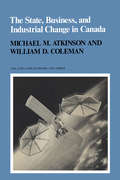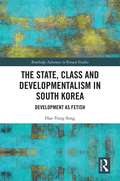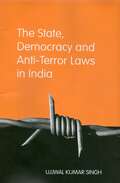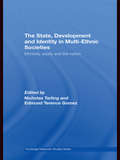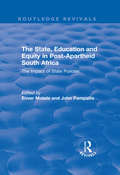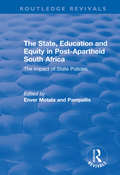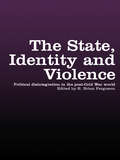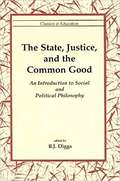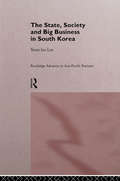- Table View
- List View
The State of Speech: Rhetoric and Political Thought in Ancient Rome
by Joy ConnollyRhetorical theory, the core of Roman education, taught rules of public speaking that are still influential today. But Roman rhetoric has long been regarded as having little important to say about political ideas. The State of Speech presents a forceful challenge to this view. The first book to read Roman rhetorical writing as a mode of political thought, it focuses on Rome's greatest practitioner and theorist of public speech, Cicero. Through new readings of his dialogues and treatises, Joy Connolly shows how Cicero's treatment of the Greek rhetorical tradition's central questions is shaped by his ideal of the republic and the citizen. Rhetoric, Connolly argues, sheds new light on Cicero's deepest political preoccupations: the formation of individual and communal identity, the communicative role of the body, and the "unmanly" aspects of politics, especially civility and compromise. Transcending traditional lines between rhetorical and political theory, The State of Speech is a major contribution to the current debate over the role of public speech in Roman politics. Instead of a conventional, top-down model of power, it sketches a dynamic model of authority and consent enacted through oratorical performance and examines how oratory modeled an ethics of citizenship for the masses as well as the elite. It explains how imperial Roman rhetoricians reshaped Cicero's ideal republican citizen to meet the new political conditions of autocracy, and defends Ciceronian thought as a resource for contemporary democracy.
The State of State Reforms in Latin America
by Eduardo LoraLatin America suffered a profound state crisis in the 1980s, which prompted not only the wave of macroeconomic and deregulation reforms known as the Washington Consensus, but also a wide variety of institutional or 'second generation' reforms. 'The State of State Reform in Latin America' reviews and assesses the outcomes of these less studied institutional reforms. This book examines four major areas of institutional reform: a. political institutions and the state organization; b. fiscal institutions, such as budget, tax and decentralization institutions; c. public institutions in charge of sectoral economic policies (financial, industrial, and infrastructure); and d. social sector institutions (pensions, social protection, and education). In each of these areas, the authors summarize the reform objectives, describe and measure their scope, assess the main outcomes, and identify the obstacles for implementation, especially those of an institutional nature.
The State of Texas: Government, Politics, and Policy Second Edition
by Sherri Mora William RugerDesigned around the Texas Higher Education Coordinating Board's new Learning Outcomes and Core Objectives, The State of Texas: Government, Politics, and Policy, second edition, provides students with a comprehensive view of Texas government.
The State of Us
by Shaun David Hutchinson<P><P>When Dean Arnault’s mother decided to run for president, it wasn’t a surprise to anyone, least of all her son. But still that doesn’t mean Dean wants to be part of the public spectacle that is the race for the White House—at least not until he meets Dre. <P><P>The only problem is that Dre Rosario's on the opposition; he’s the son of the Democratic nominee. But as Dean and Dre’s meet-ups on the campaign trail become less left to chance, their friendship quickly becomes a romantic connection unlike any either of the boys have ever known. <P><P>If it wasn’t hard enough falling in love across the aisle, the political scheming of a shady third-party candidate could cause Dean and Dre’s world to explode around them. <P><P> It’s a new modern-day, star-crossed romance about what it really means to love your country—and yourself—from the acclaimed author of We Are the Ants and Brave Face, Shaun David Hutchinson.
The State of Us: The good news and the bad news about our society
by Jon Snow'A fascinating call to arms full of insight' IndependentAfter four decades broadcasting to the nation each night, Jon Snow gives vent to his opinions on the state of our nation . . . the good news and the bad newsIt is rare in history that so many nations in the developed world are in crisis at the same time. There has been a disintegration of trust in political leaders and in the media that holds them to account. For all the progress humankind has made, for all the inventions and new technologies, our society is being undermined by inequality. To fix it, we must begin by seeking out the truth about our world.In The State of Us, Jon Snow traces how the life of the nation has changed across his five-decade career, from getting thrown out of university for protesting apartheid to interviewing every prime minister since Margaret Thatcher.In doing so, he shows how the greatest problems at home and abroad so often come down to inequality and an unwillingness to confront it. But that is not our fate. Despite the challenges, Snow has witnessed profound social progress. In this passionate rallying cry, he argues that at its best, journalism reflects not just who we are now, but who we can be.We've had enough of division; the future is for us.
The State of Welfare
by Gilbert Y. SteinerThis book examines the state of public welfare in the United States.
The State of Working America
by Josh Bivens Lawrence Mishel Elise Gould Heidi ShierholzPraise for previous editions of The State of Working America: "The State of Working America remains unrivaled as the most-trusted source for a comprehensive understanding of how working Americans and their families are faring in today's economy. "-Robert B. Reich "It is the inequality of wealth, argue the authors, rather than new technology (as some would have it), that is responsible for the failure of America's workplace to keep pace with the country's economic growth. The State of Working America is a well-written, soundly argued, and important reference book. "-Library Journal "If you want to know what happened to the economic well-being of the average American in the past decade or so, this is the book for you. It should be required reading for Americans of all political persuasions. "-Richard Freeman, Harvard University "A truly comprehensive and useful book that provides a reality check on loose statements about U. S. labor markets. It should be cheered by all Americans who earn their living from work. "-William Wolman, former chief economist, CNBC's Business Week "The State of Working America provides very valuable factual and analytic material on the economic conditions of American workers. It is the very best source of information on this important subject. "-Ray Marshall, University of Texas, former U. S. Secretary of Labor "An indispensable work . . . on family income, wages, taxes, employment, and the distribution of wealth. "-Simon Head, The New York Review of Books "No matter what political camp you're in, this is the single most valuable book I know of about the state of America, period. It is the most referenced, most influential resource book of its kind. "-Jeff Madrick, author of The End of Affluence "This book is the single best yardstick for measuring whether or not our economic policies are doing enough to ensure that our economy can, once again, grow for everybody. "-Richard A. Gephardt "The best place to review the latest developments in changes in the distribution of income and wealth. "-Lester Thurow The State of Working America, prepared biennially since 1988 by the Economic Policy Institute, includes a wide variety of data on family incomes, wages, taxes, unemployment, wealth, and poverty-data that enable the authors to closely examine the effect of the economy on the living standards of the American people. This edition, like the previous ones, exposes and analyzes the most recent and critical trends in the country.
The State of Working America: 1994-95 (State Of Working America Ser.)
by Jared Bernstein Lawrence Mishel John Schmitt"A comprehensive statistical portrait of the standard of living of working Americans. ... A very interesting and useful book. It presents a wealth of statistical information in a very accessible manner". -- Journal of Economic Issues
The State of Working America: 1996-97 (State Of Working America Ser.)
by Jared Bernstein Lawrence Mishel John SchmittThe State of Working America, 1996-97 presents a statistical portrait of the standard of living of America's working families based on the most recent data available. By thoroughly analyzing areas such as family income, taxes, wages, jobs, wealth, and poverty, Mishel, Bernstein, and Schmitt show how the current economy is reflected in the lives of American workers. The new edition will update all statistical data and add a chapter on regional differences.
The State of the American Empire: How the USA Shapes the World (The Earthscan Atlas)
by Stephen BurmanAs the USA's domination of world affairs meets ever-widening international resentment, this revealing interrogation of America's global footprint explores the complexities of its impact on the world. Covering a wide range of topics - from Wall Street to the War on Terror - The State of the American Empire traces the USA's attempts to balance national interest and global responsibility. It measures America's true effect on world trade and security, locates sites of resistance and levels of antagonism, and, looking ahead, considers the sustainability of its imperial role. With full-colour maps and graphics, this is an essential resource for understanding America's power around the world.
The State of the Arts: Culture in Toronto (uTOpia)
by Alana Wilcox Christina PalassioFreakier rich people. More suburban art. A venue for new music. Better staplers. An infrastructure for hip-hop. Laneway art. More wi-fi. A more understanding marriage between art and business. Affordable live-work spaces. What would make Toronto a better place for the arts? City Hall proclaimed 2006 the Year of Creativity. 'Live With Culture' banners flap over the city. And across the city, donors are ponying up millions for the ROM and the AGO. Culture's never had it so good. Right?The State of the Arts explores the Toronto culture scene from every angle, applauding, assailing and arguing about art in our fair burg. The essays consider the big-ticket and the ticket-free, from the CNE to unintentional art. In between, you'll find thoughts on the 'creative city' and photobloggers, Toronto on film and the fine line between part and art. Taken together the thoughts of these writers, artists and city-builders create a snapshot of culture in T.O. as it grows from 'Toronto the Good' to 'Toronto the Could' to 'Toronto the Can-Do.'Includes sixteen colour pages of eye-level Toronto, and cover art by Susan Szenes.With essays by Sandra Alland, Jason Anderson, Anna Bowness, Stephen Cain, Kate Carraway, Hanna Cho, Brendan Cormier, Natalie De Vito, Liz Forsberg, Mark Fram, Marc Glassman, Katarina Gligorijevic-Collins, Brenda Goldstein, Amy Lavender Harris, Karen Hines, Sarah B. Hood, Christopher Hume, Sam Javanrouh, Dory Kornfeld, Adam Krawesky, More Or Les, John Lorinc, James MacNevin, Claudia McKoy, Brian McLachlan, Ryan McLaren, Shawn Micallef, Jill Murray, Matt O'Sullivan, Christopher Pandolfi, Michael Redhill, Dylan Reid, Damian Rogers, Stuart Ross, Lisa Rundle, Dana Samuel, Nadja Sayej, Susan Szenes, Kevin Temple, Pablo Torres, Gayla Trail, Rannie Turingan, Jason van Eyk, Adam Vaughan, RM Vaughan, Stéphanie Verge, Lisa Whittington-Hill and Carl Wilson.
The State of the Earth: Environmental Challenges on the Road to 2100
by Paul K. ConkinAn assessment of where we are, where we&’re headed, and what we need to do before it&’s too late: &“Instructive, well-researched, and easy-to-read.&” —John T. Ackerman, Strategic Studies Quarterly This era of staggering scientific and technological innovations, with major changes in agriculture, manufacturing, commerce, and communications, seems to document unparalleled human achievement. Yet when we examine the long-term implications, it becomes clear that the delicate environmental balance that sustains life on this planet is under serious threat, and the past century may be remembered not as a period of great progress but as one marked by unrestrained consumption and failure to come close to a sustainable use of the earth&’s limited natural resources. In The State of the Earth, noted historian Paul K. Conkin provides a comprehensive analysis of the many environmental hazards that humans must face in this still-young century. Our activities have threatened the survival of many plants and animals, created scarcities in cultivatable soils and water needed for irrigation, used up a large share of fossil fuels, polluted air and water, and most likely created conditions that will lead to devastating climate changes. This is an invaluable resource for those who desire a broad yet thorough and scientifically informed introduction to present environmental challenges.
The State of the European Union: Fault Lines in European Integration (Staat – Souveränität – Nation)
by Elisabeth Springler Stefanie Wöhl Martin Pachel Bernhard ZeilingerAgainst the backdrop of combating the financial and economic crisis in the European Union for the past decade, this volume strives to explore the manifold impacts the prevailing crisis management has on the further alignment of European Integration. The efforts targeted at overcoming the financial and economic crisis evoked far-reaching consequences on the societal, economic, and political level within European member states, which in turn challenge the institutional alignment, democratic legitimacy and economic coherence of the European Union. Taking into account current developments in the EU, the contributions presented in this volume focus on the ‘fault lines’ in the integration process, i.e. questions of policy coherence, democratic accountability, financialization, militarization, migration, gendered social and economic asymmetries as well as the rise of populist and extreme right-wing parties. The volume focuses on how these different developments come together by relating aspects of transdisciplinary research to uncover the fault lines in the European integration project in the subsequent chapters. ContentEconomic and Democratic Governance • Right Wing Populism and Right Extreme Parties • Financialization and Militarization • Social Exclusion, Welfare and Migration Policies EditorsProf. (FH) Dr. Stefanie Wöhl, University of Applied Sciences BFI Vienna. Prof. (FH) Dr. Elisabeth Springler, University of Applied Sciences BFI Vienna. Mag. Martin Pachel, University of Applied Sciences BFI Vienna. Dr. Bernhard Zeilinger, University of Applied Sciences BFI Vienna.
The State, Antisemitism, and Collaboration in the Holocaust
by Diana DumitruBased on original sources, this important new book on the Holocaust explores regional variations in civilians' attitudes and behavior toward the Jewish population in Romania and the occupied Soviet Union. Gentiles' willingness to assist Jews was greater in lands that had been under Soviet administration during the inter-war period, while gentiles' willingness to harm Jews occurred more in lands that had been under Romanian administration during the same period. While acknowledging the disasters of Communist rule in the 1920s and 1930s, this work shows the effectiveness of Soviet nationalities policy in the official suppression of antisemitism. This book offers a corrective to the widespread consensus that homogenizes gentile responses throughout Eastern Europe, instead demonstrating that what states did in the interwar period mattered; relations between social groups were not fixed and destined to repeat themselves, but rather fluid and susceptible to change over time.
The State, Bureaucracy, And The Cuban Schools: Power And Participation
by Sheryl L. LutjensIn the mid-1980s Cuba began a process of ‘rectificacion’—a reform process that has bucked the trends of economic and political liberalization that are reshaping the global order. Sustaining an official commitment to socialism in the face of economic crisis and international pressures, Cuba's survival seems puzzling indeed. Sheryl Lutjens uses the C
The State, Business, and Industrial Change in Canada
by Michael M. AtkinsonThe late twentieth century has seen profound changes in the character of the international economic order. According to the authors of this study, Canada has failed to come to terms with those changes. Our industrial policy is diffuse, ad hoc, and sectoral. Michael Atkinson and William Coleman argue that in order to analyse Canada's industrial policy effectively, particular attention must be given to industry organization, state structures, and systems of interest intermediation at the sectoral level. To make such an analysis they introduce the concept of policy network, and apply it to three types of industrial sectors: the research-intensive sectors of telecommunications manufacturing and pharmaceuticals; the rapidly changing sectors of petrochemicals and meat processing; and the contracting and troubled sectors of textiles, clothing, and dairy processing. Through the lens of these sectors Coleman and Atkinson shed considerable light on the intersection of political considerations and policy development, and offer a new base on which to move forward in planning for economic growth.
The State, Class and Developmentalism in South Korea: Development as Fetish (Routledge Advances in Korean Studies)
by Hae-Yung SongThis book problematises the statist underpinnings of the concept of the ‘developmental state,’ in terms of both state–society and national–global relations, challenging the notion that the state is the agent of national development qua being autonomous from the domestic and global economies. Presenting a thorough and comprehensive critical assessment of the extant approaches and theories of the Korean developmental state in particular, this book demonstrates that the existing literature, including Marxist critiques, only inadequately and partially challenge statism. It examines how statism reinforces and is reinforced by ‘Third World Developmentalism’, the idea that ‘development’ is in itself a positive goal and that a nationally autonomous mode of development should be promoted as a means of empowerment. In opposition, this book offers a critique of statism by constructing an alternative theoretical framework, extending Marx’s concept of commodity fetishism to state–society and national–global relations. Drawing on a new theoretical framework and significant Korean literature, The State, Class and Developmentalism in South Korea offers a novel historical interpretation and critique of the developmental state in the Korean context. As such, it will be useful to students and scholars of Asian studies, Development Studies and International Political Economy.
The State, Democracy and Anti-Terror Laws in India
by Ujjwal Kumar SinghLaws like the Prevention of Terrorism Act (POTA) are enacted to address what the state describes as extraordinary situations and put in place exceptions to the ordinary legal and judicial procedures. By examining public debates surrounding extraordinary laws like POTA and the Terrorist and Disruptive Activities (Prevention) Act (TADA) and also specific cases, trials and judgements under the Acts, the author - argues that extraordinary laws have ramifications for people’s lives, political institutions, the rule of law and democratic functioning; - shows how such laws assume ‘normalcy’ and acquire a place of permanence in state practices; and - examines the ways in which such extraordinary laws manifest dominant configurations of political power and ideology. While exploring the unfolding of POTA in specific contexts, the book shows how the law was enmeshed in the politics of Hindutva, electoral and coalition politics, centre-state relations, the politics of repression and reconciliation against nationality struggles, and issues of poverty and development.
The State, Development and Identity in Multi-Ethnic Societies: Ethnicity, Equity and the Nation (Routledge Malaysian Studies Series)
by Nicholas Tarling Edmund Terence GomezThe controversial work of Amy Chua argues that, as rapid modernization, industrialization, technological change and globalization bring about fundamental changes in national, ethnic and class identities, especially in developing countries, there is a danger that the laissez-faire capitalist system will cause serious racial conflagration, especially in societies where there is ethnic minority market dominance, combined with ethno-nationalist-type politicians who mobilize support from ethnic majority communities by drawing attention to inequalities in wealth distribution. This controversial work goes on to argue for an authoritarian political system, with curbs against the corporate expansion of enterprises owned by ethnic minorities, until parity in equity ownership among all communities is achieved. This book tests the assumptions behind these arguments, discussing ethnic communities, identity, economy, society and state, and the links between them, in a range of countries in East Asia, Southeast Asia, and the Pacific, and diaspora communities of Asian peoples in the West. It demonstrates that identity transformation occurs as generations of minority communities succeed each other, that old discourses of fixed origins which are assumed to bind ethnic communities into cohesive wholes do not apply, that there are very extensive inter-linkages in the daily activities of people of different ethnic and religious backgrounds, that affirmative action-type policies along racial lines can undermine overall societal cohesion, and that there is no case for limiting democracy until economic equity is achieved. This is a rich, important book, with huge implications for economic development and for states throughout the world as multi-ethnic societies world-wide become more extensive and more complicated.
The State, Education and Equity in Post-Apartheid South Africa: The Impact of State Policies (Routledge Revivals)
by Enver MotalaThis title was first published in 2002: Has the South African post-apartheid state been able to achieve its stated goals? What has been the relationship between the process of educational reform and the impact on the state of the Constitution and other laws? This seminal book responds to these questions by examining the development and implementation of social policy in South Africa during the first years of democratic government, particularly in relation to education. The post-apartheid state was immediately faced with a broad spectrum of political, social, economic and human rights issues. The research analyzes whether the aims and objectives of the new administration were achieved; no other single collection of research in South Africa collectively explores the issues raised in this endeavour. The book will appeal to a wide range of professionals including researchers, academics, planners, policy makers, public servants and postgraduate students.
The State, Education and Equity in Post-Apartheid South Africa: The Impact of State Policies (The\making Of Modern Africa Ser.)
by Enver MotalaThis title was first published in 2002: Has the South African post-apartheid state been able to achieve its stated goals? What has been the relationship between the process of educational reform and the impact on the state of the Constitution and other laws? This seminal book responds to these questions by examining the development and implementation of social policy in South Africa during the first years of democratic government, particularly in relation to education. The post-apartheid state was immediately faced with a broad spectrum of political, social, economic and human rights issues. The research analyzes whether the aims and objectives of the new administration were achieved; no other single collection of research in South Africa collectively explores the issues raised in this endeavour. The book will appeal to a wide range of professionals including researchers, academics, planners, policy makers, public servants and postgraduate students.
The State, Identity and Violence: Political Disintegration in the Post-Cold War World (War And Society Ser.)
by R. Brian FergusonIn this book, a collection of experts investigate the varied forces - from global systems to local beliefs - that lead to civil violence, chaos and, perhaps, a new political order.The State, Identity and Violence explores acts of mass violence occurring within national borders and examines the links such acts have to personal identities and how they challenge the character or very existence of the state. Building upon the anthropological premises of holism and cross-cultural comparison, this volume shows how violent challenges to existing states should be conceptualized as layered problems, with multiple kinds of causes. It not only goes beyond the "ancient hatreds" explanation, but shows the inadequacy of the concept of "ethnic violence" and of theories which treat interests and identities as separate, sometimes opposed variables
The State, Justice, and the Common Good: An Introduction to Social and Political Philosophy
by B. J. DiggsThe State, Justice, and the Common Good An Introduction to Social and Political Philosophy
The State, Society and Big Business in South Korea (Routledge Advances in Asia-Pacific Business)
by Yeon-Ho LeeThis book examines how the South Korean state is able to execute national policies that are opposed to the interests of social constituents, despite the expansion of social power. The relationship between the government and big business provides an illuminating example of this. The author demonstrates how Confucian values, the role of the family and a firm hierarchical tradition have prevented South Korea from developing a modern state on the Western model.
